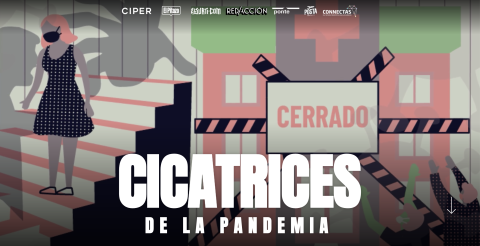
A new collaborative editorial project explores how the COVID-19 crisis in Latin America has affected the middle class, a group that has dwindled in number as millions struggle from economic and health setbacks. Six independent newsrooms, along with ICFJ partner Connectas, teamed up on the coverage, reporting on everything from mental health, jobs, access to healthcare, and the impact of the crisis on women in particular.
The six outlets are part of the cohort that participated in Velocidad, a media sustainability accelerator carried out by ICFJ and SembraMedia with support from Luminate. At the end of the accelerator, the outlets worked with Connectas, an investigative journalism organization, to produce the editorial project, called “Cicatrices de la pandemia,” or “Scars from the pandemic.”
Why this topic? In just a year and a half, millions of middle-class Latin Americans have seen their quality of life diminish. Testimonies show that the middle classes in the region suffered losses in many areas: the pandemic worsened the situation of the sector to the point that the World Bank estimates that the countries have gone back two decades in terms of poverty reduction and equity.
Mental health at stake
The quarantine and crisis provoked a rise of depression and anxiety among people who had not previously required professional help with these matters. Psychiatric appointments increased, and the abuse of alcohol and drugs did so too, as a way of finding refuge or anesthetizing the pain. Read more.
Labor informality without vaccine
Gradually, jobs are beginning to recover in Latin America. However, most of the new jobs are informal, without contributions for health or unemployment insurance or savings for retirement. Everything points to the fact that the rise of apps and self-employment masquerading as entrepreneurship, with weak labor laws, will produce increasingly precarious jobs and the perfect breeding ground for new social outbursts. See the coverage.
Independent workers, lack of help and loads of stress
The middle class makes up 37 percent of the regional population, according to the Economic Commission for Latin America and the Caribbean (ECLAC). Government assistance has been insufficient for this group. The rumba sector and the self-employed are among the hardest hit, although some have accessed credit at favorable interest rates or one-time subsidies. Often, they have held on for a year and a half thanks to their savings and contributions from supporters and family members. Read more.
Violence and confinement, a trap for women
Inside their homes, many women have been exposed to physical aggression, psychological abuse and economic deprivation. But in the most rigid stage of confinement, these levels of violence were exacerbated. And survivors who could escape these environments are still dealing with the aftermath. See the coverage.
The weight of caring
Some of the progress that women have made in economic, educational and social spheres are rolling back. During the pandemic, care work was more important than ever and was disproportionately assigned to women. That impeded many of them returning to their jobs. See the report.
Forgotten patients
The sudden shutdown of health services affected millions of patients who were used to going to private hospitals and clinics. Medical treatments were discontinued, medicines became scarce, and even getting an appointment became an odyssey. Telemedicine emerged as an alternative to the system, but it still does not fully convince users or doctors. Read the coverage.
Cicatrices de la pandemia provides testimony of how millions of middle-class people have adapted to the realities imposed by the strict quarantines and the restrictions that followed. It’s a collective work done by SembraMedia and ARCO in the framework of Velocidad with the support of Luminate and ICFJ, carried out by Ciper, El Pitazo, CONNECTAS, Red/Acción, El Surti, Ponte Jornalismo and Posta.